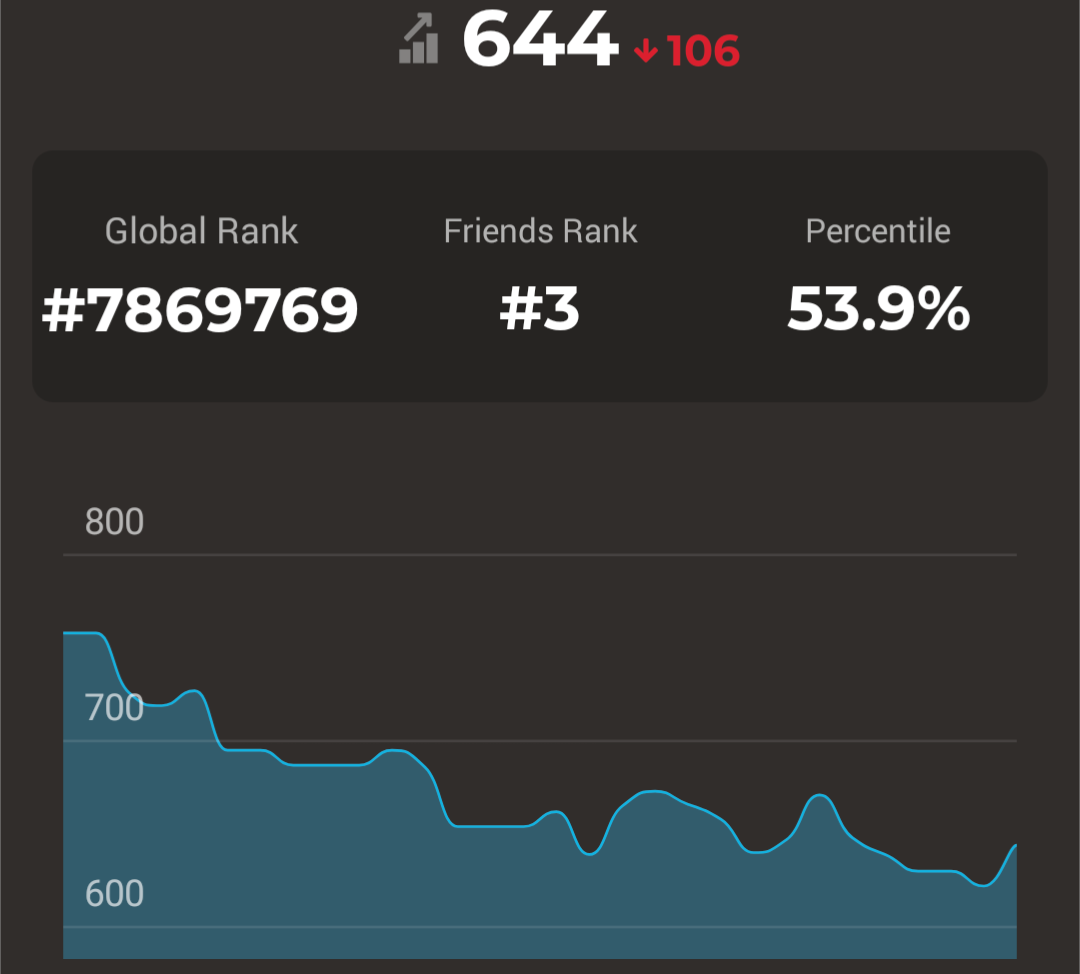Buying bandwidth - how hiring impacts your capacity
Some reflections from my holiday on the impact of strong hires on time poverty and limitations on mental bandwidth.
Sorry for the lack of writing recently, I have spent the last 6 months busy at a new job in-house at a FinTech called IG group. The work has been really interesting, but there’s a lot to do and I haven’t had the time or mental bandwidth to keep up with my previous habit of writing an article every two weeks.
Small aside: if you want a small insight into my limited mental bandwidth you can look at my decline in ELO rating on chess.com – my best live measure of how mentally occupied I am on a day-to-day basis:
Aside #2: If you’re ambitious and hungry to learn – we’re looking for smart people to join us at IG. Drop me an email at Isar.Bhattacharjee@ig.com and we can have a low pressure chat about the company and if you’d be a good fit for a role!
But anyway, I’m currently on holiday – my first proper break all year – and I have more time for chess and non-work thinking.
Taking breaks is crucial to performing at our best – but time off also helps give perspective which can be hard while you are busy with the day-to-day. One major reflection I’ve had in the first 24 hours of my break is that I really miss writing. During my peak writing period when my start-up work was in full flow I would typically have 5 or so articles at different stages of maturity on the go. The process of writing was an excellent forcing mechanism to ensure I did (what I considered to be) hard but enjoyable thinking. Shout out to Paul Graham whose regular essays were one of my big inspirations to start the original version of this newsletter.
Anyway… in my two weeks off I’ve decided to get back on the writing train. I have a few ideas but I think I’ll only manage to get one of them out in between my friend’s wedding, visiting my grandma, and flying back & forth across the North of India.
How hiring impacts time & mental bandwidth constraints
In a think-y/decision-y role, the two main constraints are typically mental bandwidth and time capacity. I wanted to talk about both of these things in the context of hiring.
I’ve been thinking a lot about hiring recently. In particularly how hiring (even a small number) of very strong people drives a non-linear impact on enjoyment and effectiveness in the workplace. The flip side is equally true – a small number of mis-hires can generate a non-linear amount of pain.
Almost every start-up I worked with was terrified of mis-hiring, resulting in founders spending large portions of their time interviewing. In fact, a friend of mine made a pretty successful business out of vetting university graduates to help start-ups avoid mis-hiring (go check out JumpStart – they’re awesome).
And outside of start-ups, as you get to bigger orgs, the task of vetting hires gets increasingly complex and time intensive. My long-suffering partner (a rockstar product manager) has been through hiring processes which involved 7-8 interviews which is not atypical of scale-ups. Google famously reached a point where some candidates had so many interviews, they launched a research project to find the optimal number (the answer is 4 - after which point marginal information gained diminished significantly).
But the degree of time investment speaks to the perceived importance of hiring.
A friend of mine (who also works at IG) and I were talking about a recent hire and he said “I haven’t thought about [Area of Work X] since [New Person] joined at all”. This was an area of work that the two of us used to speak about on a semi-regular basis as a “problem area” we really wanted to carve out time to fix. But this new hire was excellent. Within a few weeks we had such a high level of confidence that the problem area would get fixed or at least progress would be made that all this collective mental bandwidth got freed up. We could fully offload all the thinking to this new person, who we then also trust to do the delivery.
There’s some interesting psychology on mental bandwidth. When we talk about mental bandwidth, we’re often talking about working memory - which has very tight constraints. We can only really hold around 4 major thoughts in our head at any time, and if we try to do more, we end up task switching which reduces cognitive performance.
You might be unsurprised the observation about this new person. Of course, good people who you trust to deliver buy you “mental space”. Why am I even writing about this?
Well, someone I know (who for transparency doesn’t work at IG) recently spoke to me about a recent mis-hire in their team. The person hired was brought in at a medium seniority position and was expected to be fairly autonomous and effective from day 1. But they have been struggling to do it. They are not very proactive (a trait which often predicts performance is hard to change over time) and struggle with the baseline level of ambiguity that most people in this organisation have to deal with on a daily basis. The side effect of this is that the hire can do work – but struggles to do the hard thinking associated with that work.
So my friend has ended up doing all the hard thinking on their behalf.
This is a situation where a mis-hire reduces the “time constraint” that my friend has but has increased the pressure on “mental bandwidth” in exchange. Unfortunately for my friend, the trade-off between time and mental bandwidth has a pretty bad exchange rate and the net effect is that they are worse off than without the hire.
More generally - we know that time poverty also has a cost in terms of decision making quality, business performance, and general life satisfaction.
Hiring is about buying you leverage both in terms of time and mental bandwidth – but certain types of hires come with different time <> mental bandwidth trade offs:
Positive effect on mental & time leverage – Highly effective, experienced hires. They have adequate knowledge/experience, willingness to drive progress and low need for support.
Negative mental leverage but positive time leverage – Low autonomy hires who are competent doers. They are typically not used to delivering in companies without support and/or are used to a very structured work environment (e.g., from a big corporate with lots of layers/structure).
Positive mental leverage but negative time leverage – Inexperienced doers but fast/hungry learners. They might be from a start-up or consulting background without experience of the role, or may be ambitious grads.
Negative mental & time leverage – Universally seen as a mis-hires.
Which archetypes do we want and what do they need?
The top and bottom instance are easy to deal with because they generate broad consensus. The middle two are trickier to deal with, both as a manager and as a company.
I tend to find negative mental leverage/positive time leverage hires very disruptive to delivery. In part because people sometimes tend to not realise the negative impact they have on the people in their team. Typically higher performers end up carrying the higher mental toll, often at the cost of their main body of work. Worst still because these hires are “busy” they typically survive probation periods and end up “sticky”.
On the other hand, I tend to find positive mental leverage/negative time leverage people excellent to work with. You have to show them how to do things and explain why you want to do things a certain way. However, if you find the right people with this profile they also learn quickly, turning into high mental/high time leverage people who treat you with a high degree of loyalty. They are also substantially cheaper than the very experienced, good, high autonomy hires. So if you can learn to find the right people of this profile & train them well – there is a big talent arbitrage opportunity.
This is exactly why a lot of start-ups have founders’ associates, chiefs of staff or any of these generalist do-er roles for less experienced hires. I wrote a bit about some different archetypes for chiefs of staff here as bit of fun research for the Chief of Staff network last year.
But, there is a big risk. If you don’t have sufficient time to train these people or provide sufficient structure/support – the model breaks down. Having an inexperienced do-er running around without clear direction can be either ineffective & wasteful, or worse actively harmful to others in the org.
The other risk is that you miscategorise your hire, and assume they are the wrong archetype. This typically looks like one of the middle two categories being confused for the top high mental/time bandwidth profile. You tend to over-allocate these people responsibility without an appropriate support model - leading to poor outcomes.
How do you screen prospective candidates for time / mental leverage?
I am a fan of technical assessments at interview stage – for instance, a problem-solving session or a written project.
If you care about time bandwidth - give them the task as pre-work. This is of course time intensive for candidates (which is part of the point of the exercise but also doesn’t offer a great candidate experience). But it gives more insight into the candidate’s capacity to create space in their day-to-day work.
One big challenge currently is that LLMs can do a solid enough job at these technical tasks (there are some funny videos online of LLMs solving LEETCODE interview questions in less than 10 seconds). This is especially problematic for firms who use standardised LEETCODE exercises or IQ tests, rather than more complex custom technical tasks.
If you care about mental bandwidth - you can test performance in a technical task “live” during interviews (for instance consulting firms do case studies).
Final thoughts - the importance of Range and desire to be absolutely cracked at your job
Obviously hiring people who generate both time & mental leverage offer the most impact to a company. But those people are in low supply, are expensive and are hard to find.
In most corporate work environments, people have to deal with high amounts of complexity and ambiguity. We know that in these types of settings, those with a wider range of skills tend to outperform hyperspecialists - because they are more cognitively flexible and have a broader set of experiences to draw from. But a minimum amount of domain experience is critical to delivery - which suggests highly effective individuals start their life typically as inexperienced hungry and ambitious doers, who then build sufficient domain expertise.
I’m culturally quite optimistic about the pipeline of these people. Gen Z has build a culture of celebrating “absolutely cracked” operators from it’s original use in gaming to it’s frequent use in coding - there’s an increasing appetite to get extremely good at whatever domain you want to focus on.





